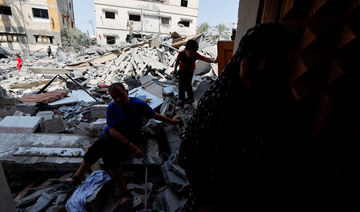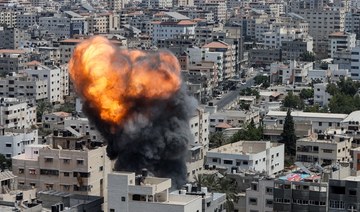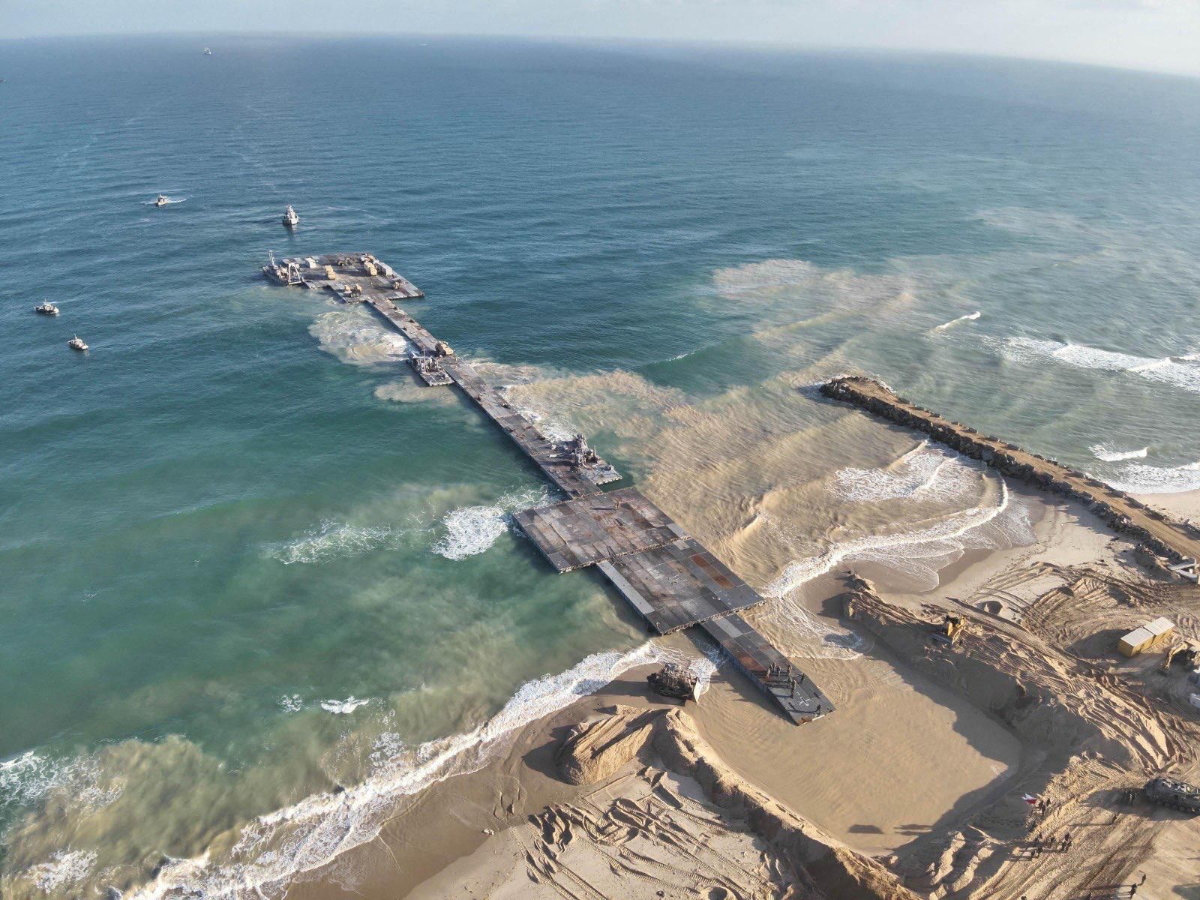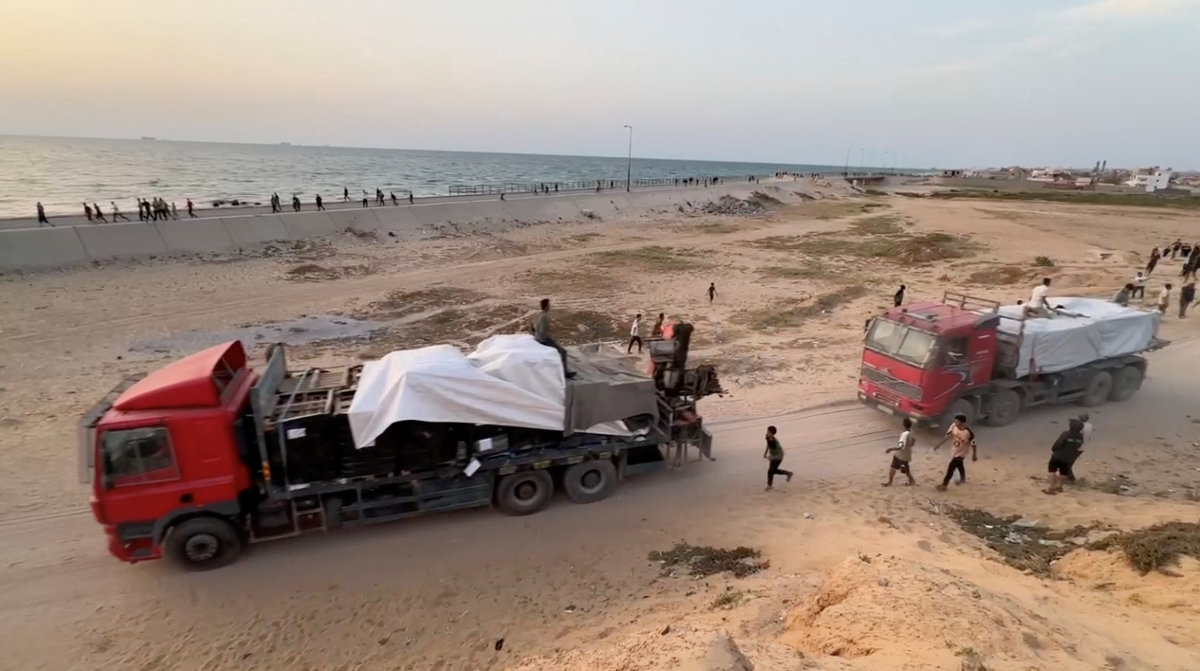LONDON: The EU on Saturday called for maximum restraint in the Gaza Strip’s worst escalation of violence since a war last year.
“The European Union follows with great concern the latest developments in and around Gaza,” a spokesman for EU’s foreign policy chief Josep Borrell said in a statement.
“The EU calls for maximum restraint on all sides in order to avoid a further escalation and further casualties,” he said.
“While Israel has the right to protect its civilian population, everything must be done to prevent a broader conflict, which would, first and foremost, affect the civilian populations on both sides and result in further casualties and more suffering.”
At least 15 people, including a five-year-old girl, have been killed inside Gaza in the latest eruption of hostilities, according to Gaza health authorities, while no deaths have been reported on the Israeli side.
Israel hit Gaza with deadly air strikes on Saturday and a Palestinian militant group retaliated with a barrage of rocket fire.
UN Middle East peace envoy Tor Wennesland said he was “deeply concerned,” warning that the escalation was “very dangerous.”
Israel has said it was forced to launch a “pre-emptive” operation against Islamic Jihad, insisting the group was planning an imminent attack following days of tensions along the Gaza border.
Russia called for maximum restraint and said it was “observing with profound worry how events are evolving,” foreign ministry spokeswoman Maria Zakharova said in a statement.
“The new escalation was caused by Israeli army firing into the Gaza Strip on Aug. 5, to which Palestinian groups responded by carrying out massive and indiscriminate bombardments on Israeli territory.”
The Arab League “condemned in the strongest possible terms the ferocious Israeli aggression against Gaza,” and called on the Israeli government to immediately stop military operations and “bear the consequences of the escalation.”
Secretary-General Ahmed Aboul Gheit is “appealing to the international community and all parties with international influence to intervene to achieve a cease-fire, warning that the continuation of military operations may lead to an escalation that no party can account for its serious consequences,” his spokesman Jamal Rushdie, said.
Secretary-General of the Gulf Cooperation Council Nayef Al-Hajraf urged the international community to act urgently for protect civilians, especially women and children.
He expressed his sincere condolences and sympathy to the families of the victims and to the government and people of Palestine, wishing the injured a speedy recovery.
The spokesman added that the “Israeli operation reflects internal tensions that could get out of control,” and stressed the “great fragility of the health sector in Gaza, which may exacerbate the effects of the military aggression.”
Jordan’s foreign ministry has “stressed the importance of halting the Israeli aggression,” and also warned of the “serious consequences of the Israeli escalation and intimidation of civilians.
Kuwait strongly condemned the raids launched by Israeli defense forces and said “this brutal aggression comes as a continuation of the crimes committed by the occupation forces and an insistence of their flagrant violation of the rules of international law and resolutions of international legitimacy.”
It called on the international community to take “immediate and swift action to stop these blatant attacks and to ensure that the occupying authorities respect the UN Charter and the rules of international law, the foreign ministry said.
Lebanon, Algeria, Libya also issued similar statements and called on the international community to take urgent and effective action to stop the escalation and provide them with protection, reiterating their firm position for the Palestinian cause and the legitimate rights of the Palestinian people.
The Arab Observatory for Human Rights said Israel’s aggression “undermines all efforts made to maintain comprehensive calm and prevent the escalation of violence that threatens international peace and security.”
Iran said the territory was “not alone” in its fight. “We are with you on this path until the end, and let Palestine and the Palestinians know that they are not alone,” Iran’s Revolutionary Guards chief Major General Hossein Salami told Islamic Jihad leader Ziad Al-Nakhala during a meeting in Tehran.
Meanwhile, National Security Council spokesman John Kirby urged calm from both sides but said US ally Israel had the right to defend itself.
“We certainly urge all sides to avoid further escalation... We absolutely fully support Israel’s right to defend itself against terrorist groups that are taking the lives of innocent civilians in Israel,” he said.
Britain also called for a swift end to the violence in the Gaza Strip, and said “the UK stands by Israel and its right to defend itself,” Foreign Secretary Liz Truss tweeted.
“We condemn terrorist groups firing at civilians and violence which has resulted in casualties on both sides.”
“We call for a swift end to the violence.”
Egypt, which negotiated a cease-fire that ended an 11-day conflict in May 2021 between Israel and Gaza militants that devastated the densely-populated Gaza Strip and forced countless Israelis to rush to bomb shelters, is working to calm the latest escalation in Gaza.
An Egyptian security source told AFP in Gaza that Cairo’s mediation efforts had been ongoing since Friday when Israel launched attacks on what it described as Islamic Jihad targets.
“We hope to reach a consensus to return to calm as soon as possible,” the source said.
Israeli army spokesman Richard Hecht had earlier referred to Egyptian mediation when briefing reporters about the bombardment, without providing specifics.
An Egyptian source separately said that a delegation from Islamic Jihad may head to Cairo later Saturday.
Hamas, the Islamist group that has controlled Gaza since 2007, has so far stayed clear of the latest round of Gaza violence, but was also in talks with Egypt.
Its Doha-based leader Ismail Haniyeh has held talks with “Egyptian intelligence” over the violence, a Hamas statement said.
(With AFP)























